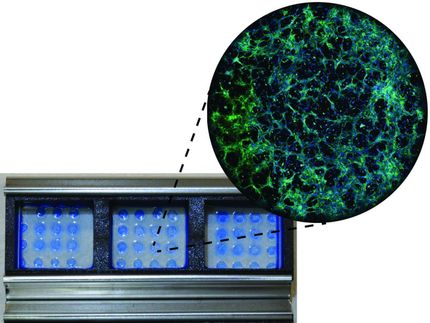Can we share vampires' appetite for synthetic blood?
Vampires on the True blood television series are already enjoying the advantages of synthetic blood. While this may seem to be only the imagination on the big screen, the true benefits of blood manufactured from embryonic stem cells may be less than a decade away.
It is unclear however whether society can develop an acceptance of cultured blood - or an appetite for synthetic meat produced by related technology. For this reason it is vital the public has every opportunity to get involved with the latest developments in stem cell research, say researchers from the Economic and Social Research Council's (ESRC) Genomics Network.
Clips from the hugely popular True Blood TV show as well as the Twilight book and film series will provide a starting point for debate on recent biotechnology developments, including stem cell research, at a public event organised as part of the ESRC's Festival of Social Science 2011.
The audience will be able to discuss a range of issues from Twilight's 'vegetarian vampires' to the possibilities of 'in vitro' meat. "The fact that synthetic blood features so prominently in the True Blood series is a great opportunity to get a new - particularly younger audience - thinking about these issues," emphasises Dr Christine Knight. "The biotechnology developments that enable production of blood and meat in the laboratory are likely to affect all of us in the coming years." For example, the potential to manufacture blood on demand for use in transfusions (up to 2 million units are needed a year) from embryonic stem cells could be a reality in just a decade from now.
However, research undertaken by the Genomics Network indicates that gathering public reactions to potential stem cell products will be key to the understanding some of the barriers encountered when introducing these products into a consumer market. Stem cell research is still considered controversial or unacceptable by some communities. "It's vital that the impact of these technologies on society is taken into account - that people understand what's involved and have the chance to learn about how and why technologies such as stem-cell derived blood products or synthetic meat are being developed.," says event speaker, Miss Emma King
Discussion of these issues, event speaker Dr Neil Stephens confirms, is crucial at this point in time. "Tissue engineering techniques could soon be applied to the production of food, producing in laboratories meat that has at no point has been part of a living animal. While at present vast technical challenges remain to the successful production of in vitro meat, the technology raises many questions for scientists, regulators and consumers to which there are no clear answers."
"It is entirely possible," he continues, "that with adequate funding in vitro meat could find a route to consumer markets and into human diets. It is equally possible that the technology could be wholly rejected by the consuming public, or might never move beyond the current stage of basic laboratory research. Will in vitro meat ever be a food, or just a Frankensteinian scientific misadventure? These are the sort of questions we need to be asking."
Most read news
Organizations
Other news from the department science

Get the life science industry in your inbox
By submitting this form you agree that LUMITOS AG will send you the newsletter(s) selected above by email. Your data will not be passed on to third parties. Your data will be stored and processed in accordance with our data protection regulations. LUMITOS may contact you by email for the purpose of advertising or market and opinion surveys. You can revoke your consent at any time without giving reasons to LUMITOS AG, Ernst-Augustin-Str. 2, 12489 Berlin, Germany or by e-mail at revoke@lumitos.com with effect for the future. In addition, each email contains a link to unsubscribe from the corresponding newsletter.





















































